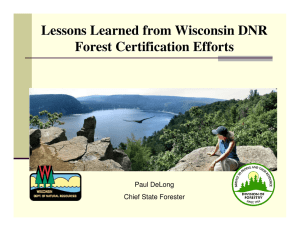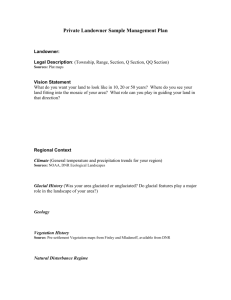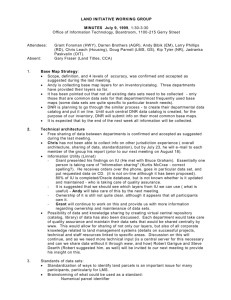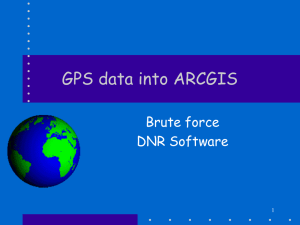Cultural Resources and the DNR: Process, Costs, and Opportunities
advertisement
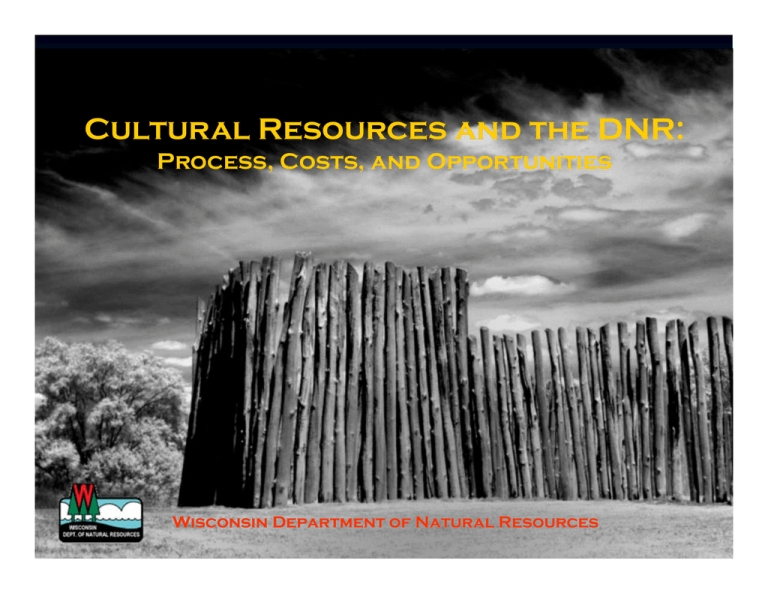
Cultural Resources and the DNR: Process, Costs, and Opportunities Wisconsin Department of Natural Resources The Wisconsin Historical Society maintains an inventory of recorded archaeological and historic structure sites - but many such sites, including sites on DNR properties - are as yet unidentified and/or unrecorded. The DNR is the State’s single-largest owner of archaeological sites, historic structures, and other cultural resources Cultural resource sites include, among many others: prehistoric villages and burial areas rock art sites fur trade era sites sunken vessels farmsteads mining camps prehistoric and historic quarries WPA & CCC era structures ferries lighthouses Aztalan National Historic Landmark Wisconsin Department of Natural Resources PALEOINDIAN (ca. <10,000 BC) thru RECENT HISTORIC (ca. present) CULTURAL RESOURCE MANAGEMENT … IS ABOUT PEOPLE, ABOUT TRYING TO PRESERVE AND INTERPRET OUR COMMON AND UNCOMMON HERITAGE. CONTRARY TO POPULAR BELIEF, DNR AIN’T JUST ABOUT LEAVES AND FISH AND BIRDS AND DEER … IT IS ABOUT PEOPLE!! NO PEOPLE = NO DNR!! IT’S ABOUT US!! Prehistoric Effigy and Burial Mounds Linear burial mound Conical burial mound Effigy (animal shaped) and linear mounds Wisconsin is the effigy-mound center of the world! Early and Recent Historic Burial Areas Abandoned cemetery with headstones Ojibwe “spirit houses”, Hayward area There is always potential to find isolated cemetery areas - some small, some quite extensive - in the course of your activities. They may be associated with families or communities known to have resided in the area. Be on the lookout for domesticated plants that would not typically be found in the area. Look for depressions consistent with burials (size, shape, distribution). Review DNR’s “Burials, Earthworks, and Mounds Preservation Policy & Plan”. Historic Structures on DNR properties Historic Structures on DNR properties wall - post rain damage “replacement-in-kind” wall repairs in progress Both federal and state laws require that cultural resources be identified and protected WISCONSIN’S PRINCIPLE HERITAGE RESOURCE MANAGEMENT LEGISLATION FEDERAL HERITAGE RESOURCE MANAGEMENT LEGISLATION Section 44.40 of Wisconsin Statutes states that “Each state agency shall consider whether any proposed action of the state agency will affect any historic property …”, and directs each agency to cooperate with the Wisconsin Historical Society in its efforts to identify and protect the State’s cultural resources. The "National Historic Preservation Act of 1966" (PL 89-665) established a national historic preservation policy; created the National Register of Historic Places and the Cabinet level Advisory Council on Historic Preservation; and established the Section 106 process, which requires a consideration of cultural resources for undertakings that are federally funded, licensed, or permitted. DNR’s actions to meet this directive are outlined in MC 1810.1. For additional information on DNR’s heritage resource program, contact Mark Dudzik, DNR Archaeologist, @ 608.266.3462 or mark.dudzik@wisconsin.gov Section 157.70 of Wisconsin Statutes focuses on the identification and protection of human burial areas including those located on either public or private property and/or otherwise not associated with public cemeteries. In the unlikely event that you should happen upon human remains, secure the area, and contact local law enforcement personnel and the state Burial Sites Preservation Program @ 800.342.7834 or 608.264.6502. Also see DNR’s “Burials Preservation Policy & Plan”. The "National Environmental Policy Act of 1969" (PL 91-190) requires that archaeological and other historic resources be considered during the environmental assessment process and in environmental impact studies. The "Archaeological Resource Protection Act of 1979" (PL 9695) established criminal and civil penalties for disturbing prehistoric and historic archaeological sites on Federal and Indian lands, and for sale, transport or receipt of archaeological resources excavated or removed from public lands or Indian lands or in violation of State or local law. The "Native American Graves Protection and Repatriation Act" (PL101-601) mandates the repatriation (return) of Native American or Native Hawaiian human remains, associated funerary items, or items of cultural patrimony held by agencies receiving federal funds. THE CULTURAL RESOURCE REVIEW PROCESS Check “Project Footprint” against DNR’s “Historical and Archaeological Site Maps” website If a “hit” or if project is federally funded, contact Mark Dudzik, DNR Archaeologist with following information: County/T/R/Section info; copy of USGS topographic map with project footprint superimposed; brief description of what project is about; note any known historic structures/archaeological sites; identify federal involvement, if any WHAT YOU CAN EXPECT DEPENDS ON … is the project FEDERAL or STATE? PLAN AHEAD! Federal (or mixed) State under provisions of Section 106 of the National Historic Preservation Act, investigations (to identify archaeological sites and/or historic buildings) may be required in advance of the project if known sites/buildings occur and even if no such sites are recorded for the parcel, to assess for their presence and to determine if they meet National Register (NRHP) criteria under provisions of Section 44.40 of Wisconsin Statutes, investigations will be required if previously recorded sites occur or if there’s an extant, recorded archaeological site and/or historic building for which NRHP eligibility is unassessed within the parcel impact area(s) regional staff notify interested Indian Tribes of project and contact DNR Archaeologist if tribes indicate interest in project if strictly an ACQUISITION, that is, no development is presently planned for the parcel, the project will likely proceed without additional investigations, but grant and other, similar documents must stipulate, and the grantee be made aware, that plans for future developments will need to be submitted to DNR for review before they are authorized if strictly an ACQUISITION, that is, no development is presently planned for the parcel, the project will likely proceed without additional investigations, but grant and other, similar documents must stipulate, and the grantee be made aware, that plans for future developments will need to be submitted to DNR and Wisconsin Historical Society (WHS; State Historic Preservations Office [SHPO]) for review before they are authorized Again, if needed, WHS reviews can take 30 days (and WHS may request more!) WHS reviews can take 30 days (and WHS may request more!) NOTE: Acquisition sans development will not typically require cultural resource review! DNR parcel STATE involvement FEDERAL Involvement WHS-recorded sites & structures as per “state involvement”, plus may need to look for new sites & structures all burial sites Local Government parcel WHS-recorded sites & structures if DNR permit, funding, etc., involved as per “state involvement”, plus may need to look for new sites & structures all NRHP/SRHP listed sites and structures; all burial sites Private parcel WHS-recorded sites & structures if DNR permit, funding, etc., involved as per “state involvement”, plus may need to look for new sites & structures all burial sites HISTORIC = 50 years old or older … but that does not mean it is “important” … that may need to be assessed. Federal projects will typically require tribal consultation. AGAIN: Acquisition sans development will not typically require cultural resource review! The Cultural Resource Review Process STATE (WI stats 44.40 and 157.70) FEDERAL (Section 106 of NHPA and NEPA) CHECK INTRANET CULTURAL RESOURCE MAPS BUREAU CONSULTS WITH TRIBES/OTHERS NO “HIT” > PROCEED WITH PERMIT OR PROJECT “HIT” > REFER PROJECT TO DNR ARCHAEOLOGIST DNR ARCHAEOLOGIST CONFIRMS & PROVIDES DIRECTION TO BUREAU REFER PROJECT TO DNR ARCHAEOLOGIST DNR ARCHAEOLOGIST PROVIDES DIRECTION TO BUREAU Private: APPLICANT COMPLETES INVESTIGATIONS DNR: DNR COMPLETES INVESTIGATIONS DNR ARCHAEOLOGIST REVIEWS RESULTS OF NON-BURIAL INVESTIGATIONS AND ADVISES BUREAU OF PROJECT CLEARANCE APPLICANT PROVIDES DNR ARCHAEOLOGIST DOCUMENTATION OF WHS BURIAL SITE PROJECT CLEARANCE DNR ARCHAEOLOGIST ADVISES BUREAU OF WHS BURIAL SITE CLEARANCE (staff are not to contact WHS) DNR’s Cultural Resource Unit will require the following information: • • • County/T/R/Section info; copy of USGS topographic map with project footprint superimposed thereon; brief description of what project is about DNR: DNR COMPLETES INVESTIGATIONS WHS/SHPO REVIEWS RESULTS OF INVESTIGATIONS AND CLEARS PROJECT (Sherman Banker [608.264.6507]); WHS REVIEWS RESULTS OF BURIAL SITE INVESTIGATIONS (Sherman Banker [608.264.6507]; Chip Brown [608.264.6508] in Banker’s absence) REFER TRIBAL QUERIES TO DNR ARCHAEOLOGIST SHPO ADVISES DNR ARCHAEOLOGIST OF CLEARANCE [staff are not to contact WHS/SHPO]) DNR ARCHAEOLOGIST ADVISES BUREAU OF SHPO CLEARANCE NOTE: the above is for DNR-initiated projects only; when projects already involve a federal agency, the applicant is responsible for consultation, completing Section 106required investigations, etc. – and must provide DNR with a signed copy of the WHS/SHPO sign-off form (as well as a description of the project, copy of the project map, and copy of any report of cultural resource investigations) in advance of DNR project permitting, funding, etc. DNR will provide state permitting clearance after receipt of the above DNR’s Cultural Resource Unit will require the following information: • • • • County/T/R/Section info; copy of USGS topographic map with project footprint superimposed thereon; brief description of what project is about; identify federal agency INITIATE CULTURAL RESOURCE REVIEW EARLY IN THE PLANNING PROCESS! INITIATE CULTURAL RESOURCE REVIEW EARLY IN THE PLANNING PROCESS! ASI (Archaeological Site Inventory) maps & data projects referred for additional review are checked against the WHS’s ASI map set and database when there is “overlap” of project and archaeological site footprints - or if project is federal - you are advised about investigations needed in advance of the project proceeding subsequently, reports of investigations are reviewed and cleared (may go to WHS, as needed) upon clearance, local offices so advised – or otherwise advised how to proceed ASI (Archaeological Site Inventory) maps & data projects referred for additional review are checked against the WHS’s ASI map set and database when there is “overlap” of project and archaeological site footprints - or if project is federal - you are advised about investigations needed in advance of the project proceeding subsequently, reports of investigations are reviewed and cleared (may go to WHS, as needed) upon clearance, local offices so advised – or otherwise advised how to proceed AHI (Architecture & History Inventory) maps & data projects referred for additional review are checked against the WHS’s AHI map set and database when there is “overlap” of project and historical site footprints - or if project is federal - you are advised about investigations needed in advance of the project proceeding subsequently, reports of investigations are reviewed and cleared (may go to WHS as needed) upon clearance, local offices so advised – or otherwise advised how to proceed Detailed, accurate maps of the parcel or project area make all the difference! actual location plotted location actual location actual location plotted location plotted location ADDITIONAL HERITAGE RESOURCE INFORMATION Wisconsin Historical Society website: http://www.wisconsinhistory.org DNR, Bureau of Facilities & Land’s “Archaeological and Other Cultural Resources” map website: http://intranet.dnr.state.wi.us/int/land/facilities/facilities/arch.html DNR, Manual Code 1810.1 Advisory Council on Historic Preservation website: http://www.achp.gov ARCHAEOLOGICAL SITES TO VISIT Aztalan State Park, Lake Mills - the state’s archaeological crown jewel, built by prehistoric Mississippian peoples (from the presentday St. Louis area) – a federally-designated National Historic Landmark. Roche-a-Cri State Park, Adams-Friendship - wonderful prehistoric rock art, recently vandalized. Lizard Mound County Park, West Bend - fantastic effigy mounds including panthers, birds and, of course, a “lizard”! Effigy Mounds National Monument, Marquette, IA - one of America’s archaeological treasures. See also: “Archaeological Parks in the US” @ http://www.uark.edu/misc/aras/index.html People have settled here, raised families here, worked here, and died here for thousands of years. Common people built this land, this place we call Wisconsin. They hunted mammoth along the edges of continental glaciers. They cleared the land and they raised crops. They built towns and cities. DNR manages these cultural resources - physical records of our common past - on behalf of the public. But story of Wisconsin is not just a story of the past. It is our story as well, for the story of this place continues … Thanks!! Mark Dudzik, Departmental Archaeologist
